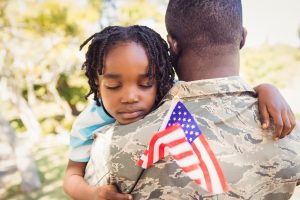Multi-Faith Veteran Initiative in Community through Community

The Multi-Faith Veteran Initiative (MVI) works in partnership with Chicago communities to improve the quality of life for veterans and veteran families. More specifically, MVI seeks to strengthen the capacity of faith-based institutions to partner with behavioral health resources, community organizations, and other service providers to engage with and support the Veteran community.
While veterans, on average, successfully transition to civilian life, a significant number face challenges, which result in harm and distress. Since many veterans are reluctant to seek assistance from the Veteran’s Administration (VA), the faith community is poised to serve as a valuable resource in assisting veterans’ efforts to reconnect to their community.
The Initiative takes a broader community approach to addressing veterans who struggle with issues of Moral Injury and Post Traumatic Stress Disorder (PTSD). The development of veteran community spaces within local houses of worship provides a mechanism to strengthen community coordination around veteran and veteran family issues. This effort facilitates an organic collaboration with not only faith stakeholders but also among behavioral health and social service providers within the community including the local Veteran’s Administration.
An Asset-Based, Community-Engagement Approach
MVI provides faith leaders with information that assists them in understanding the broader transition issues of veterans. This training focuses on: Military Culture, PTSD, Traumatic Brain Injury, Suicide, Military Sexual Trauma and Moral Injury.
The Initiative takes an asset-based community-engagement approach that seeks to identify and connect the unique gifts that exist within a community. In this case, it is linking the gifts of veterans to faith communities and other key institutional and community resources to:
- Create a network of recognizably branded “veteran-friendly” faith-based organizations and houses of worship that are equipped with knowledge and skills to understand and address the needs of veterans and their families.
- Integrate houses of worship and faith-based organizations into local networks of social service providers.
- Raise awareness about faith-based resources for veterans.
- Equip, train and support those who are actively involved with faith-based and community-based organizations, to help them broaden the spectrum of local services offered for veterans and their families living in their communities.
- Promote the active role of veterans as valuable community assets.
- Contribute to maximizing the use of resources and services currently available specifically for veterans
Increase knowledge on the role of faith-based organizations and houses of worship in veterans’ behavioral health and in informing policy.
A Bottom-Up Approach
The Initiative’s focus centers on a bottom-up approach, rather than a client-centered approach and views community-building through a threefold lens.
First, as a partner, the community provides veterans with companionship for the transition journey.
Second, as a practitioner, the community provides access to particular expertise needed at different points during the transition.
Lastly, as a place of practice, the community provides a safe space through which to learn how to achieve goals while also having opportunity to participate in community- building activities that consistently take place all around each veteran hub. The focus here is on engaging community as the lead in:
- Identifying the types of services and/or assistance required by veterans,
- Serving as the conduit for connecting veterans and veteran family members to resources accessible to them within the community and
- Providing opportunities for veterans to participate in local efforts to address a variety of issues impacting the community in which they live.
This model brings together the full community of: faith-based leaders, mental health practitioners, veteran service providers, pastoral care practitioners and other interested parties in creating and facilitating open, safe, welcoming spaces that enhance the military- to- civilian transition for the veteran and their family.
The model also provides an opportunity to increase the number of veterans and veteran family members who experience positive life outcomes, who overcome self-destructive behaviors where they exist, and who become agents of transformation in the communities where they choose to reside and serve.
The role of the faith community is central to providing space in addressing the invisible wounds that some veterans carry.
For additional information on MVI contact Walidah G. Bennett at wbennet6@depaul.edu.



